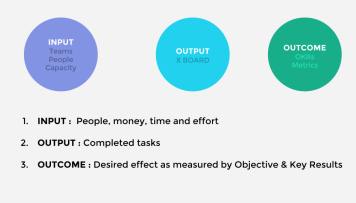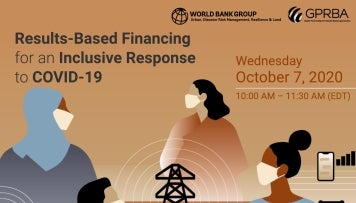The global crisis sparked by the COVID-19 pandemic has provided new insight into the functionality and resilience of outcome-based financing (OBF) programs in the face of unforeseen circumstances, according to experts at the sixth session of the U.K.’s Government Outcomes Lab (GOLab) “Engaging with Evidence” series.
OBF can present a cost-effective and innovative way for both public and private providers to deliver services to vulnerable populations when used in appropriate circumstances. But panelists in the webinar argued that the pandemic has elucidated nuances and vulnerabilities of OBF that will allow for a more comprehensive understanding of its utility in future projects.
Jessica Lopez Taylor and Max Bode (former consultant) of the World Bank’s Global Partnership for Results-Based Approaches (GPRBA) discuss their recent publication, “Outcome-Based Financing for Service Delivery: with key considerations for the recovery from COVID-19”. They explained the importance of building contingency plans into the design of OBF programs, such as the World Bank’s Ghana Education Outcomes Fund, which was undergoing preparation at the onset of the COVID-19 pandemic in early 2020. “If we’re only tying payments to learning outcomes, and we encounter issues such as school closures,” Taylor explained, “then these investors really are taking a huge risk.”
Before an OBF program is launched, Taylor continued, there should be language in the contract to allow for unprecedented complications: “if there is an event, such as COVID-19, that leads to school closures, how can we think about some intermediate outcomes to help reduce the risk of service providers and of investors?”
Research on the success of impact bonds, a form of OBF where impact investors provide the upfront capital, has yielded similar findings in the context of the COVID-19 pandemic.
Clare FitzGerald of the University of Oxford’s GOLab presented the results of 31 social impact bonds (SIBs) financed by the UK Life Chances Fund, which found that impact bonds demonstrated “particular strengths around service continuity and adaptation, driven by human factors and flexible resources.”
Vital to the successful implementation of impact bonds, FitzGerald argued, is flexible, efficient, and detailed decision-making at the lowest possible level. Only then can impact bonds be functionally and structurally resilient to large-scale shocks like the pandemic.
Although the COVID-19 pandemic has highlighted some of the constraints and susceptibilities of OBF programs, it has also created a space for new creativity in the design of such programs. Impact bonds have historically been used in social sectors such as education and employment, but practitioners are looking into new opportunities to apply impact bonds and other outcome-based approaches in infrastructure sectors where they haven’t previously been used, such as solid waste management, said Maitreyi Bordia Das, Practice Manager of Global Programs at the World Bank’s Urban, Disaster Risk Management, Resilience, and Land Global Practice.
Panelists from the Brookings Institution, World Bank, British Asian Trust, and F4J Consulting Services also reflected on the expanding possibilities for the use of OBF in development projects, especially in areas hit hardest by the pandemic. Emily Gustafsson-Wright of the Brookings Institution explained that while OBF is not the right tool for first response in emergency situations due to factors such as extensive lead times and funding contingent on longer-term results, it can play an important role in long-term recovery by reducing government and donor risk, addressing liquidity constraints, and strengthening systems that allow countries to build back better in the wake of crises like the COVID-19 pandemic.
(Review GPRBA presentation)
(for more information, visit the GOLab website.)








